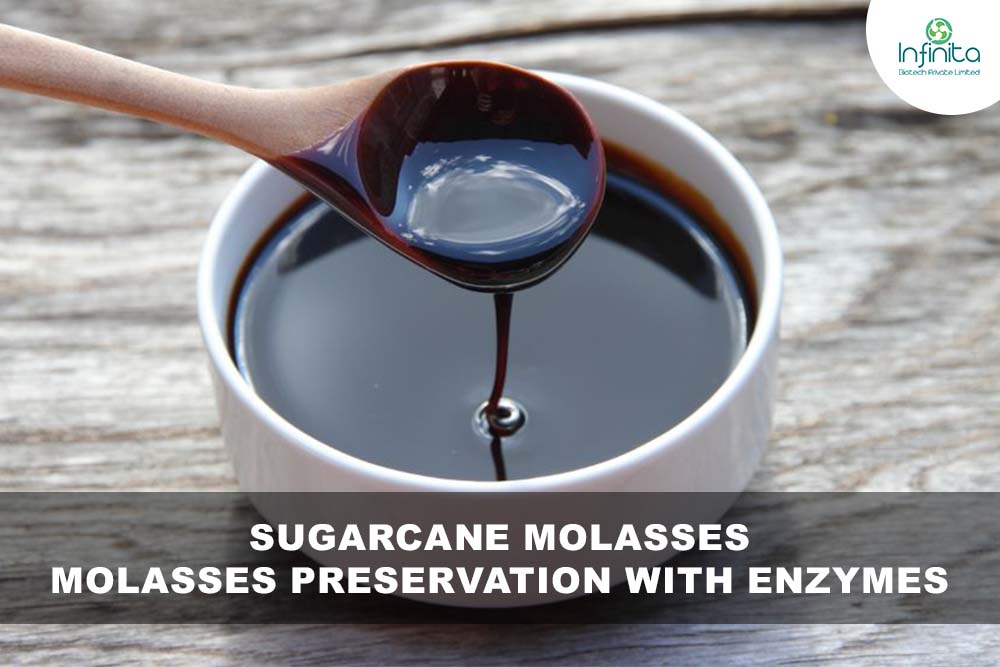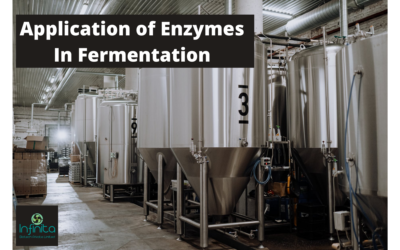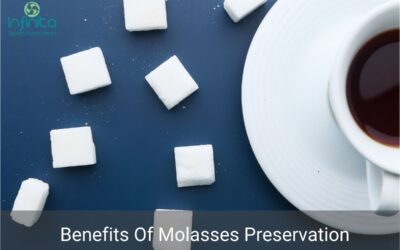
Sugarcane Molasses – Molasses Preservation with Enzymes
Molasses, also known as treacle syrup, is obtained by sugar crystallisation from sugarcane or sugar beet juice. The syrup is separated from sugar crystals by centrifuging. Separation from the sugar crystals frequently occurs during production, resulting in multiple molasses classes. Sugarcane Molasses gained through the first extraction contains more sugar, sweeter in taste, and is lighter in colour than the second or third extractions.
How are Molasses Made From Sugarcane?
Initially, manufacturers crumble sugar cane or beets to extract the juice and then heat it to make sugar crystals. Once they separate crystals from the juice, molasses is obtained in the form of a thick and brown leftover syrup. Manufacturers do this process repeatedly to obtain different grades of molasses each time, and various grades have different industrial uses.
Molasses gained through the first extraction are edible and utilised in baking, candy manufacturing, and rum preparation. Other low-grade sugarcane molasses are used in the industrial manufacturing of vinegar, citric acid and other related products.
What Is Molasses Preservation?
Molasses includes nearly 50% of sugar content, and if the Brix level is greater than 85, it should not be degraded during the preservation. In any case, it is not unusual to see a decline in sugar during capacity. In some cases, this decline can be revved without increasing the temperature, resulting in a change in the colour and odour of molasses. Hence, the sugar level drops quickly and acidity increases.
An enlarged microbial population can be observed through microscopic observation during molasses preservation. Additionally, microbial investigation can confirm the creation of two microorganisms in the conglomerate as single bacteria that required a 30% base sucrose material when produced under anaerobic circumstances. When the consortium was disrupted under aerobic circumstances, no isolates could take more than 5% sucrose.
Molasses can be preserved for up to a year in an unopened container in cold, dry, and dark areas. Moisture and heat are the biggest risks for molasses, and both can develop mould in molasses. Therefore, it is vital to preserve molasses in airtight containers and ensure the jug’s brim dries before securely fixing the container after each use. Molasses can not be used once the mould is developed, and it can create a stained patch on molasses. Molasses can not be used again once any bad odour, stained patch, or crystallisation occurs.
Enzymes Formulation As A Molasses Preservative And Their Effects
Worldwide yielding of molasses has reached 55 million tons annually. Conventionally, molasses is used in the feed industry. Additionally, some eco-friendly bioprocesses have been established to produce quality bioproducts through molasses. When molasses is produced in such huge quantities, preserving molasses while maintaining its quality at the same time is crucial for industrial units.
During preservation, molasses quality maintenance is a challenge, especially for the alcohol industry. Industries are using many items to minimise molasses degradation and maximise alcohol output. Biocides are the most utilised solutions by industry, although they do not provide a full solution to preventing molasses degradation during storage.Enzymes formulation, as a unique combination of enzymes, provide a full solution for molasses preservation by avoiding decreasing sugar degradation and regulating volatile acid generation in stored molasses. Proteolytic enzymes keep the TRS value stable for 180 days (6 months) or until the application is discontinued.
Molasses preservation needs particular solutions to prevent the deterioration of sugar value in molasses in preparing alcohol. Infinita Biotech’s enzymes stop molasses deterioration by reducing the microbial growth at 20ppm and save 5-7% of TRS while preserving molasses for up to 6 months.
How To Get Enzymes Formulation For Molasses Preservation?
The rising prices of enzymes have enabled researchers to focus on and investigate alternative ways of producing enzymes and enhance existing methods for producing enzymes inexpensively and sustainably. Microbial sources are preferred over plant and animal sources due to technological advantages such as shorter fermentation periods, larger yields, and economic feasibility.
As one of India’s leading biotech companies, Infinita Biotech provides effective Enzymes formulation and fermentation boosters for molasses and cane juice distilleries. The company is known for its customised enzymes that help boost alcohol production and enhance the efficiency of manufacturing plants.
MOLASSES PRESERVATION
Our specialized enzymatic formulations preserve the valuable sugars in the molasses during storage.

Protects Total
Reducing Sugars

Controls
Bacterial
Proliferation

Prevent Organic
Acids Formation
FERMENTATION BOOSTER FOR MOLASSES AND CANE JUICE DISTILLERY
Our customised enzymes-based formulation increases alcohol/ethanol production and improves the overall efficiency of the plant.

Conversion Of Non-
Fermentable Sugars
To Fermentable

Eliminates
Bacterial
Contamination

Lowers Residual
Sugar
Related Articles
Choosing the Best Enzymes for Craft Distilling Spirits
Introduction to Enzymes in Craft Distilling What are Enzymes? Enzymes are biological catalysts that accelerate chemical reactions within living organisms. They're crucial for various processes, including digestion and metabolism. In craft distilling, enzymes play a...
Application Of Enzymes In Fermentation
Application Of Enzymes In Fermentation Amylases are a class of enzymes that have a wide range of applications in the textile, brewing, food, pharmaceutical, and detergent industries. They are the enzymes that break down glycogen or starch. Amylases can be derived from...

Sugarcane Molasses – Molasses Preservation with Enzymes
Molasses, also known as treacle syrup, is obtained by sugar crystallisation from sugarcane or sugar beet juice. The syrup is separated from sugar crystals by centrifuging. Separation from the sugar crystals frequently occurs during production, resulting in multiple molasses classes. Sugarcane Molasses gained through the first extraction contains more sugar, sweeter in taste, and is lighter in colour than the second or third extractions.
How are Molasses Made From Sugarcane?
Initially, manufacturers crumble sugar cane or beets to extract the juice and then heat it to make sugar crystals. Once they separate crystals from the juice, molasses is obtained in the form of a thick and brown leftover syrup. Manufacturers do this process repeatedly to obtain different grades of molasses each time, and various grades have different industrial uses.
Molasses gained through the first extraction are edible and utilised in baking, candy manufacturing, and rum preparation. Other low-grade sugarcane molasses are used in the industrial manufacturing of vinegar, citric acid and other related products.
What Is Molasses Preservation?
Molasses includes nearly 50% of sugar content, and if the Brix level is greater than 85, it should not be degraded during the preservation. In any case, it is not unusual to see a decline in sugar during capacity. In some cases, this decline can be revved without increasing the temperature, resulting in a change in the colour and odour of molasses. Hence, the sugar level drops quickly and acidity increases.
An enlarged microbial population can be observed through microscopic observation during molasses preservation. Additionally, microbial investigation can confirm the creation of two microorganisms in the conglomerate as single bacteria that required a 30% base sucrose material when produced under anaerobic circumstances. When the consortium was disrupted under aerobic circumstances, no isolates could take more than 5% sucrose.
Molasses can be preserved for up to a year in an unopened container in cold, dry, and dark areas. Moisture and heat are the biggest risks for molasses, and both can develop mould in molasses. Therefore, it is vital to preserve molasses in airtight containers and ensure the jug’s brim dries before securely fixing the container after each use. Molasses can not be used once the mould is developed, and it can create a stained patch on molasses. Molasses can not be used again once any bad odour, stained patch, or crystallisation occurs.
Enzymes Formulation As A Molasses Preservative And Their Effects
Worldwide yielding of molasses has reached 55 million tons annually. Conventionally, molasses is used in the feed industry. Additionally, some eco-friendly bioprocesses have been established to produce quality bioproducts through molasses. When molasses is produced in such huge quantities, preserving molasses while maintaining its quality at the same time is crucial for industrial units.
During preservation, molasses quality maintenance is a challenge, especially for the alcohol industry. Industries are using many items to minimise molasses degradation and maximise alcohol output. Biocides are the most utilised solutions by industry, although they do not provide a full solution to preventing molasses degradation during storage.Enzymes formulation, as a unique combination of enzymes, provide a full solution for molasses preservation by avoiding decreasing sugar degradation and regulating volatile acid generation in stored molasses. Proteolytic enzymes keep the TRS value stable for 180 days (6 months) or until the application is discontinued.
Molasses preservation needs particular solutions to prevent the deterioration of sugar value in molasses in preparing alcohol. Infinita Biotech’s enzymes stop molasses deterioration by reducing the microbial growth at 20ppm and save 5-7% of TRS while preserving molasses for up to 6 months.
How To Get Enzymes Formulation For Molasses Preservation?
The rising prices of enzymes have enabled researchers to focus on and investigate alternative ways of producing enzymes and enhance existing methods for producing enzymes inexpensively and sustainably. Microbial sources are preferred over plant and animal sources due to technological advantages such as shorter fermentation periods, larger yields, and economic feasibility.
As one of India’s leading biotech companies, Infinita Biotech provides effective Enzymes formulation and fermentation boosters for molasses and cane juice distilleries. The company is known for its customised enzymes that help boost alcohol production and enhance the efficiency of manufacturing plants.
0 Comments
Submit a Comment
You must be logged in to post a comment.
MOLASSES PRESERVATION
Our specialized enzymatic formulations preserve the valuable sugars in the molasses during storage.

Protects Total Reducing Sugars

Controls Bacterial Proliferation

Prevent Organic Acids Formation
FERMENTATION BOOSTER FOR MOLASSES AND CANE JUICE DISTILLERY
Our customised enzymes-based formulation increases alcohol/ethanol production and improves the overall efficiency of the plant.

Conversion Of Non- Fermentable Sugars To Fermentable

Eliminates Bacterial Contamination

Lowers Residual Sugar
Choosing the Best Enzymes for Craft Distilling Spirits
Introduction to Enzymes in Craft Distilling What are Enzymes? Enzymes are biological catalysts that accelerate chemical reactions within living organisms. They're crucial for various processes, including digestion and metabolism. In craft distilling, enzymes play a...
Application Of Enzymes In Fermentation
Application Of Enzymes In Fermentation Amylases are a class of enzymes that have a wide range of applications in the textile, brewing, food, pharmaceutical, and detergent industries. They are the enzymes that break down glycogen or starch. Amylases can be derived from...
What Is Molasses Preservation?
What Is Molasses? Benefits Of Molasses Preservation Molasses or dark treacle is a gooey item as a result of refining sugarcane or sugar beets into sugar. Molasses differs by the measure of sugar, strategy for extraction, and age of the plant. Sugarcane molasses is...




0 Comments